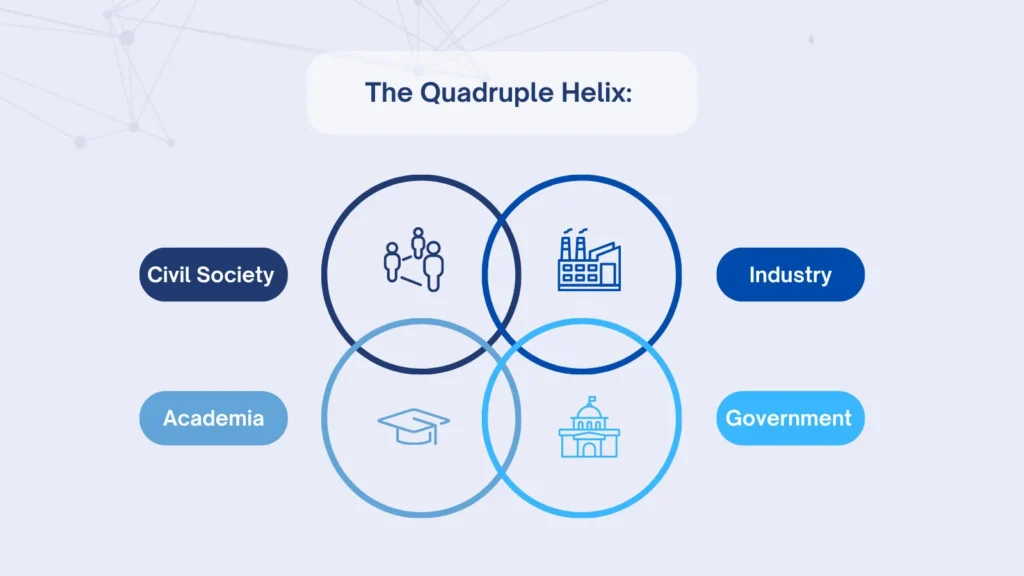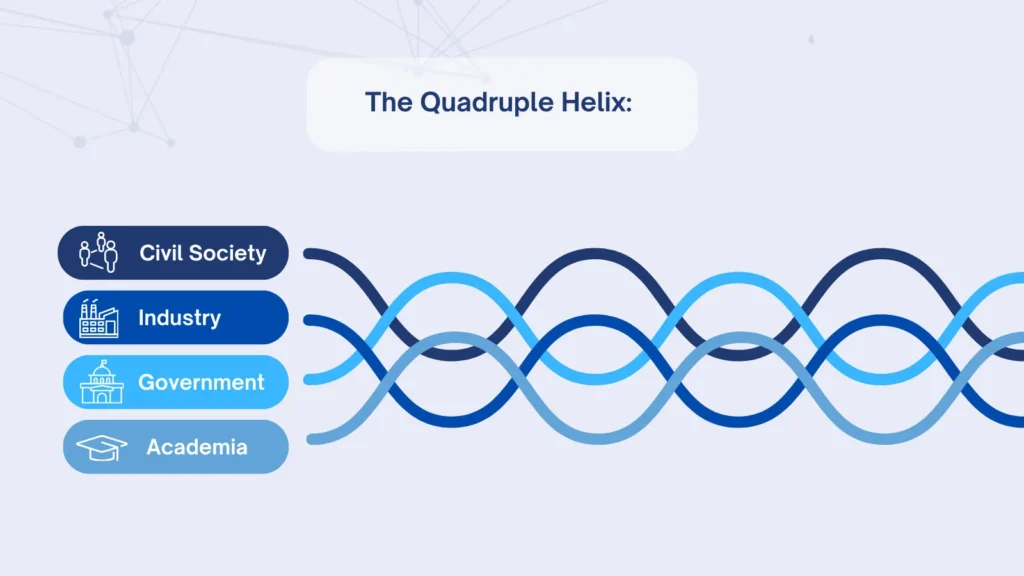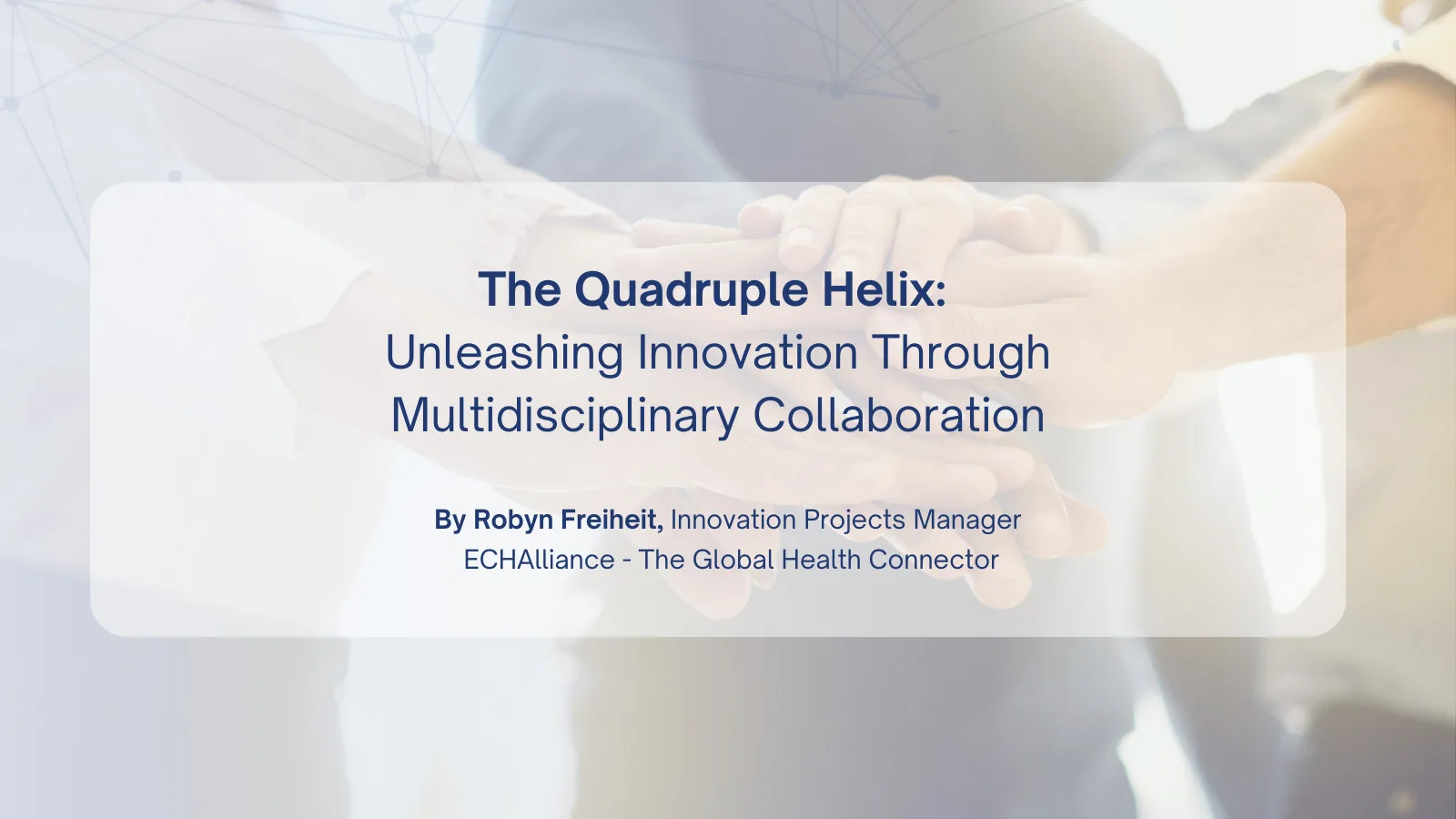In the constantly evolving landscape of innovation, a paradigm shift has occurred, redefining what it means to provide inclusive frameworks for collaboration. Introducing the Quadruple Helix Model – a model which emphasizes the idea that innovation is most successful when all sectors collaborate and co-create for needs-driven solutions. Although the Quadruple Helix contains government, industry, academia, and civil society as its four segments, it transcends the confines of these sectors – emphasizing the crucial role of multidisciplinary and cross-sectoral stakeholders in fostering impactful innovation projects which are both inclusive and effective.
The Quadruple Helix Model builds upon pre-established models of collaboration, but now incorporates a fourth dimension – the active involvement of civil society. This dynamic interaction among academia, industry, government, and civil society forms a holistic approach to innovation, harnessing the collective intelligence, skills, and resources from diverse perspectives.

To break each of the categories of the Quadruple Helix down a bit:
- In innovation, the government (public sector) plays a crucial role in creating policies, regulations, and frameworks that support and incentivize innovation. It also provides funding and resources for research and development initiatives.
- The industry (private sector) includes businesses and industries, and is responsible for driving economic growth through innovation. Companies invest in research and development, create new products and services, and contribute to job creation and economic prosperity.
- Academia (knowledge and education sector) represents a key player in generating new knowledge, conducting research, and educating the next generation of innovators. Academia contributes to the development of human capital and cutting-edge research that can be applied in real-world scenarios.
- And finally, civil society (social sector) represents the broader community, including non-profit organizations, citizens, and various interest groups. In the context of the Quadruple Helix, civil society is recognized as a source of valuable insights, needs, and societal challenges. Engaging with civil society ensures that innovation addresses real-world issues and has a positive impact on society.
One of the key drivers behind the Quadruple Helix is the recognition that societal challenges are complex and interconnected, usually requiring solutions that go beyond the capabilities of any single sector alone. The collaboration between academia, industry, government, and society brings together a wealth of knowledge, expertise, and real-world insights, creating a productive environment for innovation to flourish based on its key principles of:
- Collaboration and co-creation – addresses complex challenges and fostering innovation
- Open innovation – allowing for the exchange of ideas, expertise, and resources
- Social responsibility – encouraging inclusion of ethical considerations, sustainability, and societal well-being in the innovation process
- Knowledge exchange – facilitating the exchanges of knowledge and expertise between sectors

Multidisciplinary collaboration lies at the heart of the Quadruple Helix, emphasizing the importance of breaking down silos and fostering a culture of openness. By bringing together individuals with diverse backgrounds, skills, and perspectives, innovation projects can benefit from a rich offering of ideas, problem-solving approaches, and creative thinking. This multidisciplinary approach not only can help to accelerate the pace of innovation but also helps to ensure that solutions are comprehensive and adaptable to various contexts – as seen in various studies regarding `Smart Cities´ design principles.The Quadruple Helix Model is particularly relevant in the context of today’s global challenges, such as climate change, public health, and economic inequalities. These complex issues demand a comprehensive and inclusive approach, where stakeholders from all sectors collaboratively contribute to finding solutions.
As one example pertaining to the work we do within the ECHAlliance Innovation Team, our CONNECTINGHEALTH project, has been actively engaging in various opportunities which collaborate with cross-sectoral individuals in fostering interconnected inclusive innovation ecosystems across Europe while maximizing the value of innovation in the sector of (digital) health. As of recently, we have been conducting focus groups which aim to uncover and better understand the synergies between various sectors with consideration to building a desirable future of digital help. We are also working to better understand which actionable steps can be taken to achieve this future and by whom, and to gain insight on which cross-sectoral dependencies exist in order to make that happen. Secondly, in the Gravitate-Health project, focused on empowering and equipping Europeans with health information for active personal health management and adherence to treatment, we support stakeholder engagement amongst international external ecosystems. We have been actively working to collaborate with our external partners on finding meaningful ways of creating project awareness opportunities amongst their diverse stakeholder groups. In addition, we have been engaging with these knowledge-based communities to assess readiness to implement our project outputs, while educating internal project stakeholders on how this diverse representation can assist us in connecting the dots in the outside world when it comes to uptake and implementation. Ecosystems are a prime example of the Quadruple Helix in motion as they often are representative of various groups and they are so important to be included in innovation projects as they help provide real-world context from a development and implementation perspective, can help test for readiness to market, an can assist in advocating for project outputs to be implemented across sectors.
In conclusion, the Quadruple Helix represents a paradigm shift in innovation, emphasizing the integral role of multidisciplinary and cross-sectoral collaboration and placing more importance on participatory research. By actively involving academia, industry, government, and society, innovation projects become more resilient, relevant, and impactful. This holistic approach, although with its challenges, is essential for addressing the intricate challenges of our time and in creating a future where innovation serves the well-being of society as a whole. The Quadruple Helix is not just a model; it’s a philosophy that drives us towards a more collaborative, inclusive, and innovative future.

